A quarter of a century after the Rio de Janeiro Earth Summit, and almost a decade after the 2015 Paris Agreement, the environment, climate change and sustainability are increasingly urgent priorities around the world. How do we move from a sense of urgency to climate action?
This article summarises the main achievements of seven Italian municipalities that took part in URBACT’s National Practice Transfer Initiative. Inspired by the municipality of Mantua and its experience in an URBACT Transfer Network, these municipalities were able to mobilise cultural creators and their audiences to combat climate change.
Hidden in plain sight: the cultural elements of climate action
And am I to condemn myself, Or am I to forgive myself?
What do I have to do with it?
And if I have anything to do with it,
To what extent am I guilty?
- La Fuga (Marlene Kuntz)
The above lyrics are from Italian Indie rock band Marlene Kuntz as part of an album dedicated to the climate emergency. Time and time again, the cultural and creative sectors have championed climate action. However, public discourse on the nexus between culture and climate action is still in its infancy.
It is up to cities, and their administrators, to champion the role of cultural and creative sectors in sustainable urban development policies. In Italy, this process has started through URBACT’s National Practice Transfer Initiative, whereby different cities adapted an URBACT-awarded practice developed by Mantua (the ‘transfer city’).
URBACT’s National Practice Transfer journey, Italian style
Between June 2021 and December 2022, seven medium-sized Italian cities (with populations of no more than 60 000) joined the Italian National Practice Transfer Initiative. More specifically, Avellino, Ferrara, Cuneo, Rovereto, Siena, Corigliano-Rossano and Sestri Levante successfully transferred an URBACT Good Practice developed by the commune of Mantua.
The origins of this Good Practice can be traced back to URBACT’s C-Change Transfer Network, for which Mantua and other partner European cities committed themselves to transferring the URBACT Good Practice of Manchester's MAST (the Manchester Arts Sustainability Team).
The following examples from the national transfer partners highlight their experience working together to understand, adapt and reuse the experiences of C-Change and Mantua. Each municipality has managed to implement small-scale actions, together with stakeholders at various levels and from different sectors, to jump-start change in line with the European Green Deal and the UN 2030 Agenda.
1. Putting pen to paper: co-designing climate action plans with the art and cultural sectors
URBACT Local Groups were very important for ensuring the transfer of the Good Practice across the seven Italian municipalities. They involved different departments and services (European Office, Environment, Culture and Communication Offices) and external stakeholders operating in the arts, culture, but also sports and environmental fields.
A symbolic – and yet, still concrete – achievement of this experience was the Manifesto for the Environmental Sustainability of Cuneo's Cultural, Arts, Sports and Environmental Sectors (April 2022). Adopting a participatory co-design process, the URBACT Local Group ensured the Manifesto was signed by more than 20 local organisations in Cuneo. “With the signature of the Manifesto”, explains Cristina Clerico, Councillor for Culture of the City of Cuneo, “organisations commit to pursuing the achievement of the shared goals in their activity, and applying the criteria described by the Manifesto at the best of their possibility, such as the use of local ‘farm-to-fork’ products for catering and restaurant activities, the decrease in electricity consumption or the use of low-emission transport options for organisers, artists and event participants.”
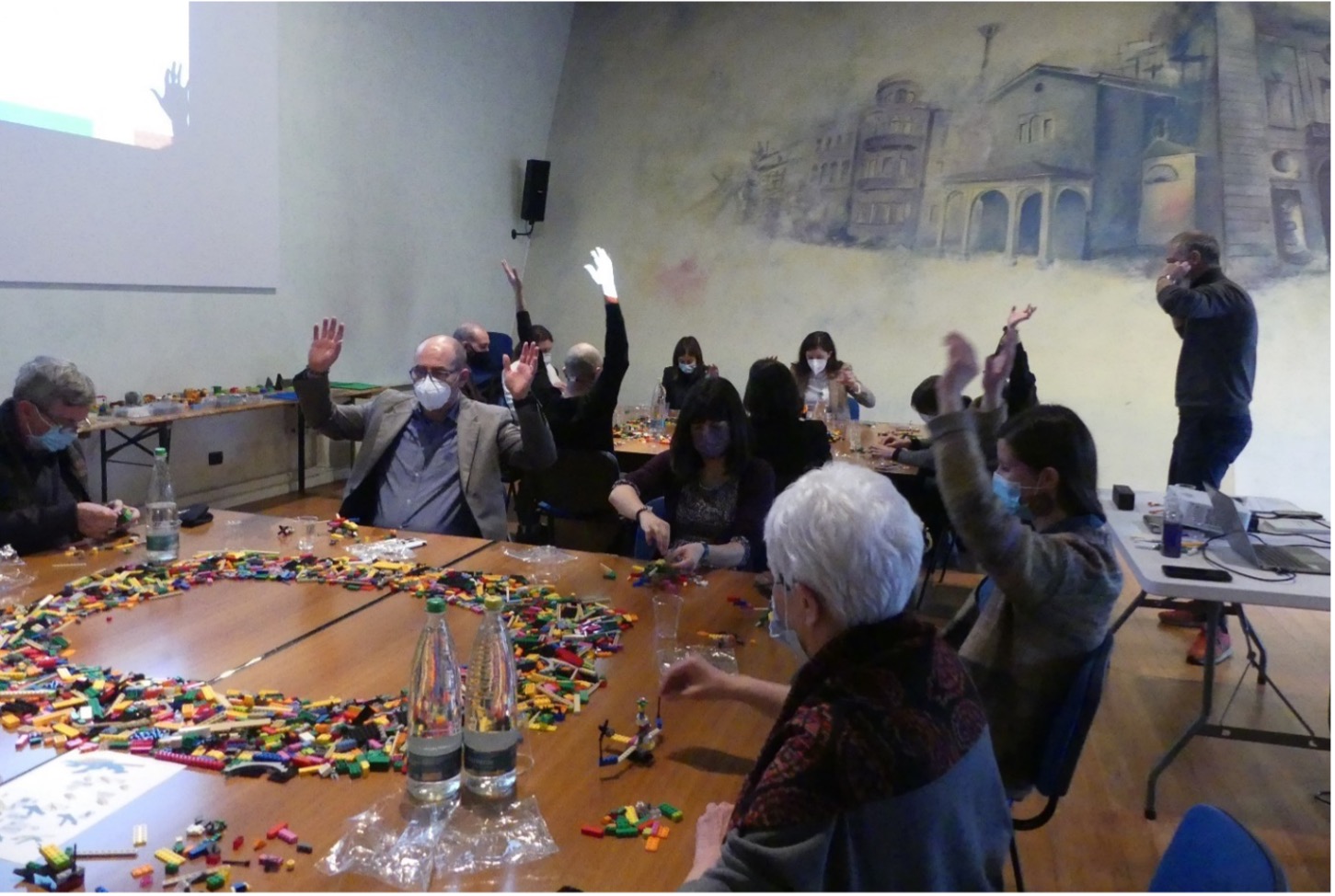
The URBACT Local Group in Cuneo develops the Manifesto using Lego Serioues Play©.
2. Cultural festivals go green
In almost all municipalities involved in the Network, joint events shared a twofold objective. First, they showed how a cultural event can mitigate its environmental impact, using sustainability criteria co-defined with URBACT Local Groups and based on the Mantua Good Practice. Second, they raised awareness of environment and climate change issues through the language of art and culture, from theatrical performances to literature.
In Siena, for example, a series of events were organised as part of the annual ConversAzioni Carbon Neutral event, while Rovereto organised a panel, ‘Cities and the Climate Crisis. Climate change mitigation and adaptation in URBACT projects’, as part of the annual Informatici Senza Frontiere Festival.
In May 2022, the URBACT Green Fest of Avellino was organised by experimenting with some guidelines for eco-friendly events originally gathered by Mantua during the C-Change Transfer Network:
• Accessibility
• Use of digital materials
• Local food
• Reusable/washable tableware and utensils
The three-day series of events also saw – for the first time – the collaboration of different associations as well as meetings and debates on ‘green’ themes. Numerous activities were organised, with special attention to children: a traveling theatre performance on the themes of eco-sustainability, workshops on plants, film screenings, theatre workshops and seminars. The success of the Festival prompted Avellino to organise a second edition, a Green Winter Festival, addressing pertinent local issues such as energy poverty.
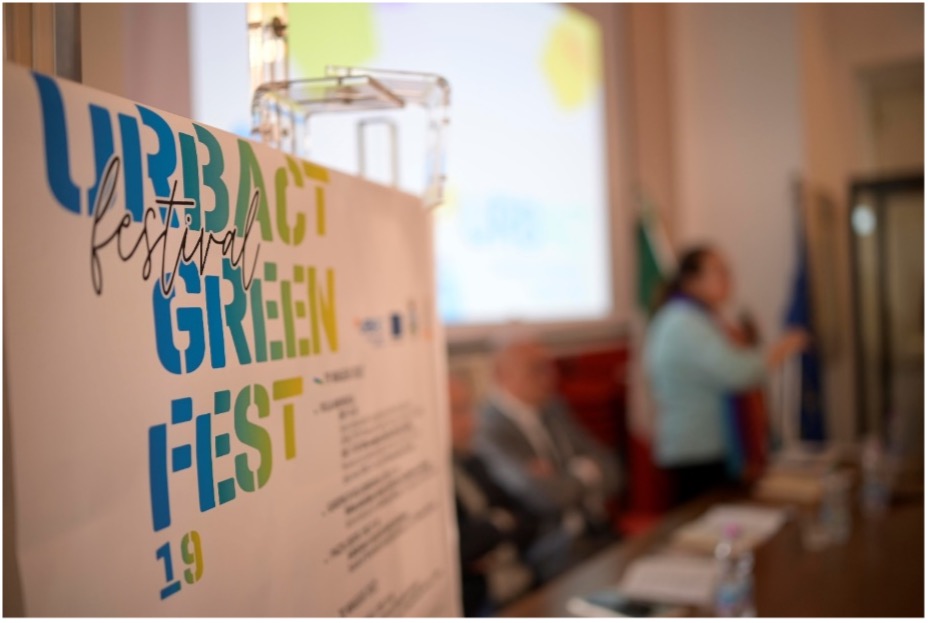
The Avellino URBACT Green Fest poster.
Sestri Levante changed the management of its online service for event organisers, with a brand-new form dedicated to green and climate considerations. “Although it is not (yet) compulsory to fill in this new section, it makes cultural practitioners and organisations who organise events of all kinds in the city think about climate and the environment”, says Elisa Raffo, Responsible for the Communication Office of the Sestri Levante Municipality. “And at the same time it allows us to map how the city's cultural/artistic initiatives are working to protect the environment and climate action.” Through a participatory process, the municipality has also created a set of guidelines, a useful tool for local organisations that contains both practical suggestions for organising events and indications that can facilitate the measurement and monitoring of the environmental impact of events so as to verify the level of improvement.
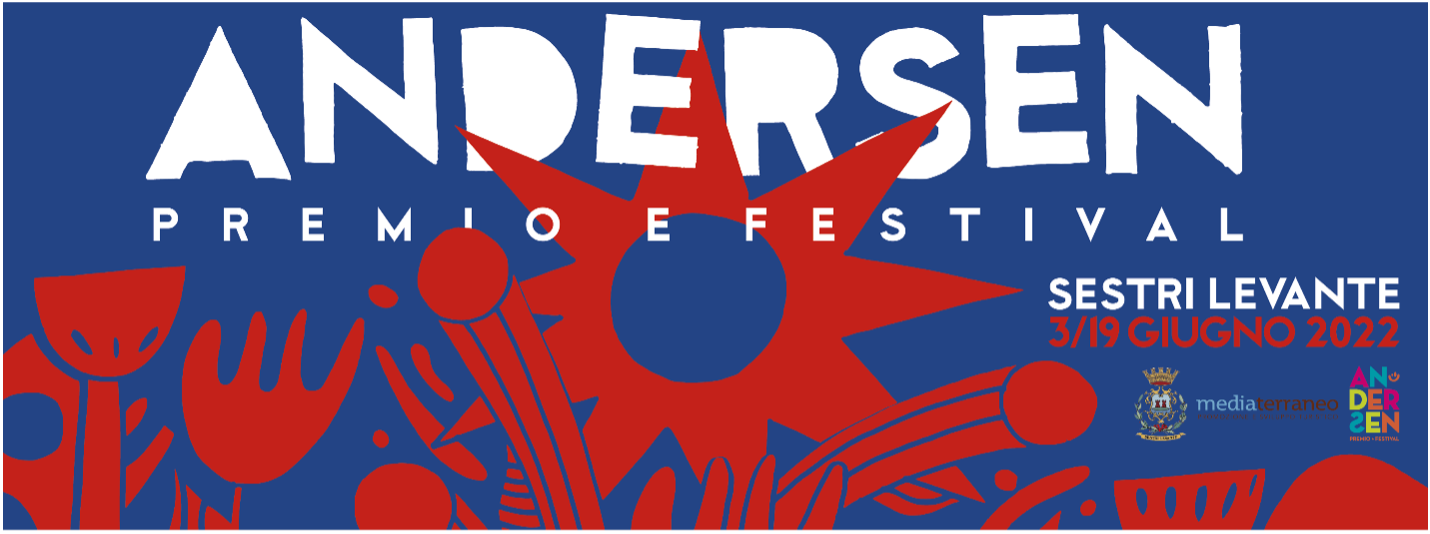
The annual Andersen Festival in Sestri Levante.
3. Protecting the climate is the message
Rovereto is a good example of how communication is crucial for climate action. Thanks to a survey addressed to cultural stakeholders in the city, Rovereto discovered early on that a general awareness campaign was needed to communicate to the population at large.
The Rovereto, culture for the environment communication campaign displays the sustainable actions implemented by local organisations in 19 posters. Together with a specialised agency, each organisation prepared a key message and took part in a photo shoot, representing the different ways culture and art address sustainability goals in their city and surrounding area.
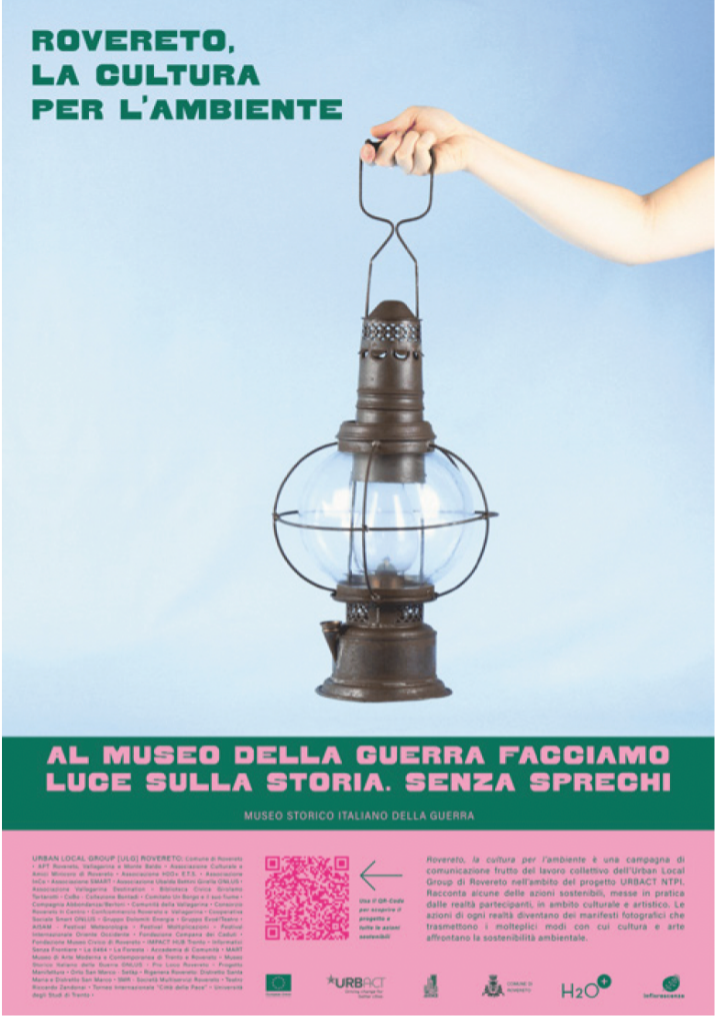
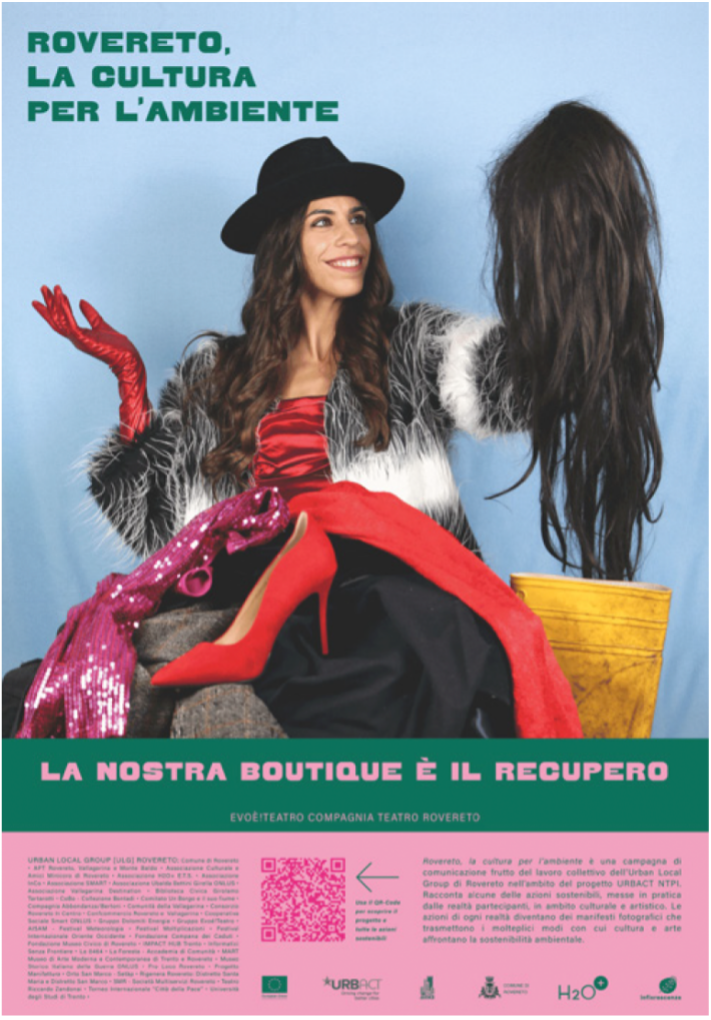
The awareness-raising campaign in Rovereto.
4. Building capacity: top-down or bottom-up?
In May 2022, ANCI, the National URBACT Point in Italy and Coordinator of the National Practice Transfer Initiative, organised a Carbon Literacy training day. It was open to all the cities in the network and was facilitated by Arianna Tonelli, the Sustainability Manager of the Mantua Literature Festival and a certified Carbon Literacy trainer. Many cities have since decided to replicate the training.
An interesting side-effect of participating in the URBACT initiative is the project ACQUA: Environment, Culture, Quality of Life to Educate for Global Citizenship. This is a project, funded by the Italian Agency for Development Cooperation, is led by Rovereto in partnership with Mantua and Cuneo.
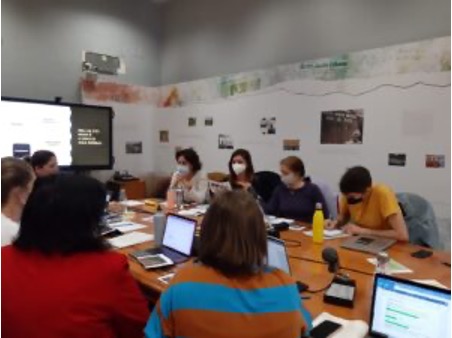
Carbon Literacy for National Practice Transfer Initiative cities.
5. Investing money and time in green procurement
While the Network was active, a consultation process was launched in Italy around public procurement reform discussions. “We decided to involve municipalities as much as possible in the consultation on the MEC [Minimum Environmental Criteria] reform,” explains Simone D'Antonio, former coordinator of Italy’s National URBACT Point. “So, we facilitated a peer review process.” The MEC requirements of Green Public Procurement have become Law in January 2023.
During one of nine online webinars, the seven Italian municipalities considered and commented on the feasibility of concrete application in real contexts. The results of this informal consultation process were presented during a meeting held in February 2022 in Ferrara, where a lively focus group was carried out as a moment of collective discussion during which challenges, opportunities and critical issues of the process were identified.
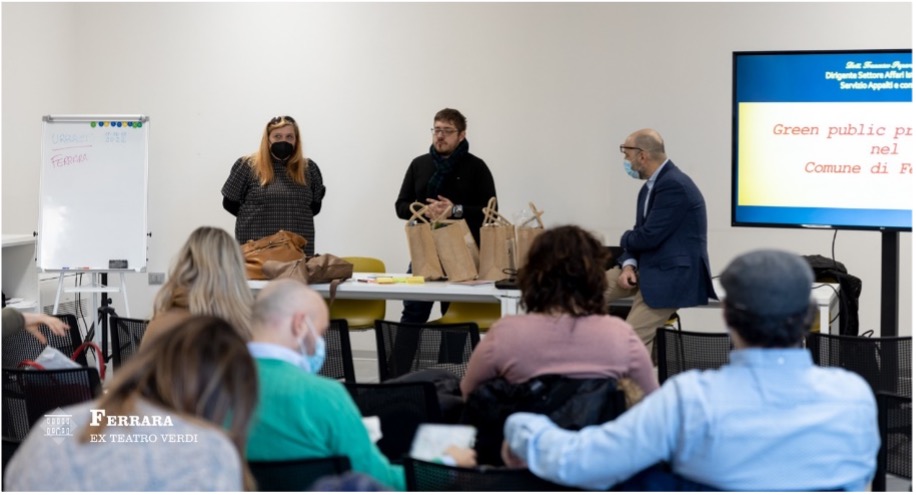
Discussing Green public procurement in Ferrara.
Looking at results to look forward
Cultural and artistic events hold enormous potential to reach zero-net emissions and to raise awareness among citizens on less impactful behaviours and actions for our planet.
Within the URBACT Network context, the activities featured in this article drew inspiration from Manchester and Mantua, with the aim of enhancing the involvement of art and culture stakeholders in climate action at urban level. The national transfer experience was short, but eye opening. Now, it is important to codify the experience into urban policy, by integrating it into broader urban vision plans and strategies.
Want to read more about the URBACT National Transfer experience? Learn about the transfer of playful practices In Ireland and other stories from URBACT Networks.
The latest URBACT Call for Good Practices closed in July with 249 submissions. Stay tuned for the results.


